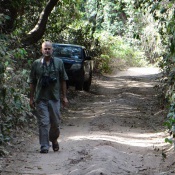Is hybridization between wolves and dogs shaping the evolutionary trajectory of wolf populations in human-dominated landscapes?
Hybridization is increasingly recognized as a powerful evolutionary force for several reasons: (i) Its importance as a promoter of speciation; (ii) Its role in shaping adaptation through introgressive hybridization; (iii) It offers a mechanism that generates evolutionary novelties through recombination and (iv) it can be responsible for the extinction of species by promoting the erosion of species boundaries and the genetic homogenization of distinct populations. In this context, hybridization between wolves and dogs offers a particularly interesting case for study. The spread of domesticated genes into natural populations could disrupt local adaptation and increase genetic homogenization eventually leading to the extinction of wolves through introgressive hybridization. Additionally it has been suggested that the introgression of mutations originally selected in domestic animals may provide a mechanism for the adaptation of populations to a rapidly changing environment. With this proposal we are interested in clarifying the role that hybridization plays in guiding the evolutionary trajectory of wolves living in human-dominated landscapes. More specifically: (1) How relevant is historical and ongoing hybridization in shaping the genetic composition of wolves in human-dominated landscapes as measured in a genomic scale? (2) How do patterns of brain gene expression match with other wolf/dog studies, as well as with other pairs of wild/domesticated forms, and is there any evidence suggesting the occurrence of a process of self-domestication in Iberian wolves? (3) And finally, can we find evidence for a general mechanism promoting the regular occurrence of hybridization episodes between wolves and dogs, facilitating the introgression of genetic variation appeared under domestication? Taking advantage of the newly available sequencing technologies we will answer these questions by investigating (i) the patterns and dynamics of hybridization between wolves and dogs through time, (ii) the dispersal and gene flow between wolf populations, (iii) effective population sizes in, at least, two time periods; iv) the patterns of gene expression within the Iberian wolf brain and other wolves occurring in wild landscapes to explore the possibility for the occurrence of a process of self-domestication in wolves adapted to live in human-dominated landscapes. The results of this proposal will impact our knowledge about the general subject of hybridization between wild species and their domestic counterparts at both a theoretical and at an applied level. This proposal will contribute to the career development of the PI and post-doctoral fellows in the team and to the advanced training of young MSc and PhD students.
José Vicente López-Bao, Luís Llaneza




